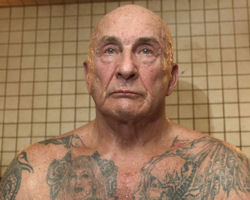Russian Organized Crime
 Organized crime exists all over the world, which is no secret to anyone, just as it is no secret that it flourishes in countries where the economy is seriously ill. Belarus, Chechnya and Russia are virtual "mafia states" and Ukraine was going to be one. For each of those countries, one cannot differentiate between the activities of the government and organized crime [organizovanic prestupnost] groups. Economic influence, sooner or later always reaches political power. A key factor in a government's ability to combat OC depends on the extent to which the country's best attorneys and law firms represent the mafia.
Organized crime exists all over the world, which is no secret to anyone, just as it is no secret that it flourishes in countries where the economy is seriously ill. Belarus, Chechnya and Russia are virtual "mafia states" and Ukraine was going to be one. For each of those countries, one cannot differentiate between the activities of the government and organized crime [organizovanic prestupnost] groups. Economic influence, sooner or later always reaches political power. A key factor in a government's ability to combat OC depends on the extent to which the country's best attorneys and law firms represent the mafia.
Modern Russia exhibits "dual power", in which the outward and visible actions of the "legitimate" state find their counterpart in the illegitimate hidden hand of Russian Organized Crime. The term "dual power" is historically associated with the Russian Revolution of 1917 and refers to a situation where two competing power structures exist simultaneously within a country. The most prominent example of dual power in history occurred in Russia after the February Revolution, when the Provisional Government led by liberal and moderate socialists took power from the Russian monarchy, while the Soviets, representing workers, soldiers, and peasants, also held significant influence.
Already in the late 1990s, it became obvious that organized crime had ceased to be interested in influencing the government, but wanted to become the government itself. Organized crime, having accumulated primary capital, was extremely concerned about covering this capital - both legalizing it and protecting it. As a result, organized crime formed two main waves: one was engaged in a massive investment of "common funds" in legal business, the second wave penetrated into the authorities. The authorities, in general, were not against it themselves, and organized oncoming traffic. Almost every leader always had a deputy who contacted authoritative people and “resolved issues”.
Obviously, organized crime in Russia had a significant difference from the traditional models of Italy, the United States, and Japan. A situation can be considered a classic when representatives of organized crime, having reached the commanding heights in the state, create laws. This cuts off the potential for a repeat of their criminal career. In Russia, there is no such legislative regulation. There are ample opportunities to establish control over certain regions, areas of business, to receive huge funds, but there is no effective tax system, no law on private ownership of land. Under these conditions, the hypothetical possibility of redistribution always remains.
The problem could be solved according to the American recipe: to create an agency which would protect the political class from organized crime, becoming a barrier between them. In Russia, there was neither a political class nor Edgar Hoover, and therefore at the beginning of the 2000s, from the regional level, which had already been captured by bandits and curators fused with them to the point of indistinguishability, power passed into the hands of criminals at the federal and at the highest level.
Discussing Russian organized crime does not imply that all or even most people in Russia are involved in such activities. The majority of Russian citizens are law-abiding and have no connections to organized crime. The term "Eurasian mafia" was more socially acceptable and what the Russians certainly prefer. The term Russian mafia can be a misnomer since these criminal groups sometimes involve Ukrainians, Georgians, Belarusians or Chechens. There was a stigma surrounding the phrase "Russian mafia", but it was acceptable to say "Sicilian mafia."
The vory v zakone [Thieves-in-Law] do not engage in racketeering and murder, preferring to distance themselves from this activity and focus on crimes that are further up in the hierarchy, such as corruption of high-level ministers. The level of power that vory v zakone operate at was indicated by their level of interaction with these public servants, because cabinet-level officials do not spend time with unimportant people and cannot be tempted by those who do not have something important to offer.
The threat and use of violence was a defining characteristic of Russian organized crime. Violence was used to gain and maintain control of criminal markets, and retributive violence was used within and between criminal groups. The common use of violence was not surprising since extortion and protection rackets are such a staple of Russian criminal activity.
ROC had relatively little or no involvement in some of the more traditional crimes of US organized crime, such as drug trafficking, gambling, loan sharking, etc. On the other hand, these varied criminal groups are extensively engaged in a broad array of frauds and scams [of the sort they perfected in the Soviet Union during the Period of Stagnation], including health care fraud, insurance scams, stock frauds, antiquities swindles, forgery and gasoline tax evasion schemes.
 Since the collapse of the Soviet Union, the world became the target of a new global crime threat from criminal organizations and criminal activities that have poured forth over the borders of Russia and other former Soviet republics such as Ukraine. The nature and variety of the crimes being committed seems unlimited—drugs, arms trafficking, stolen automobiles, trafficking in women and children, and money laundering are among the most prevalent.
Since the collapse of the Soviet Union, the world became the target of a new global crime threat from criminal organizations and criminal activities that have poured forth over the borders of Russia and other former Soviet republics such as Ukraine. The nature and variety of the crimes being committed seems unlimited—drugs, arms trafficking, stolen automobiles, trafficking in women and children, and money laundering are among the most prevalent.
The spillover was particularly troubling to Europe (and especially Eastern Europe) because of its geographical proximity to Russia, and to Israel, because of its large numbers of Russian immigrants. But no area of the world seems immune to this menace, especially not the United States. America was the land of opportunity for unloading criminal goods and laundering dirty money. The transnational character of Russian organized crime, when coupled with its high degree of sophistication and ruthlessness, attracted the world’s attention and concern.
The privatization of state property that began in Russia in 1992 — when public property began to be sold to private investors — both expanded and solidified the complex relationship that had developed between the state and organized crime. Because of its connections to officialdom and to the shadow economy, organized crime took part in what has become the enormously lucrative scheme of privatization. As a result, the assets controlled by organized crime give it enormous economic power, and hence political power as well. These assets enable criminal organizations (in various guises) to deal directly with the state—on behalf of their own economic interests — from a position of parity.
The bandits enter a newly opened enterprise and politely ask the owner who he pays and who guards him. If the latter does not pay anyone, then those who came will guard him, and, naturally, he will pay them. The "roof" (krysha) is the provision of the most favored nation treatment, when the bandits control deliveries, contracts, compliance with obligations by counterparties, break through loans, sometimes provide them themselves, find customers, etc. Naturally, such "roofs" cost up to 50-70% of the company's monthly profit. Bandit "protectorate" - the most common form of pressure on the company. The supervising gang leaves several of its people in the office of the company, for a fee, acting watchmen and telephone numbers for communication. In this case, the bandits do not protect the interests of the company and its employees. The cost of the "protectorate" is 20-40% of the company's income.
Organized crime in Russia uses legal businesses as fronts for illegal activities and for setting up illegal product lines. It creates “political clans” to exercise political power and seeks to create and regulate markets to exercise economic power. Russian criminals make extensive use of the state governmental apparatus to protect and promote their criminal activities. For example, most businesses in Russia—legal, quasi-legal, and illegal—must operate with the protection of a “krysha” (roof). The protection was often provided by police or security officials employed outside their “official” capacities for this purpose. In other cases, officials are “silent partners” in criminal enterprises that they, in turn, protect.
Through networks of financial-industrial groups or holding companies, central and regional organized crime groups penetrate into each other’s territory, where they struggled for political and economic spheres of influence. The expansion of organized crime in Moscow, for example, occurred through buying real estate, and through gaining controlling shares of banks and other enterprises. These crime groups, in turn, bought up controlling shares in various regional banks and enterprises on a broader regional level outside of Moscow.
|
NEWSLETTER
|
| Join the GlobalSecurity.org mailing list |
|
|
|

